You are using an out of date browser. It may not display this or other websites correctly.
You should upgrade or use an alternative browser.
You should upgrade or use an alternative browser.
Essential The Africa the Media Doesn't Tell You About
- Thread starter TommyHilltrigga
- Start date
More options
Who Replied?Secure Da Bag
Veteran
Being the cleanest city in Africa brings the thighs and the titties like that?



Secure Da Bag
Veteran
Debunking racist lies about Africa's place in history, writing, engineering
Secure Da Bag
Veteran
Kenya politics stealing from the people
Secure Da Bag
Veteran
UNSC will give 2 African countries permanent seats but no veto power
Secure Da Bag
Veteran
True Size of Africa
I found my wife in Africa I thank the good LORD
KnickstapeCity
The Big Dikk King
Secure Da Bag
Veteran
Burkina Faso creates 1st bank not based on CFA.
Angola begins construction of pharmaceutical plant
Pedro Mbinza
October 21, 2024 10:37

Photo: DR
The Angola Sovereign Fund signed a participation agreement for a pharmaceutical project to be developed in the Huambo province, with an initial investment of 5 billion kz.
The Angola Sovereign Fund (FSDEA), in partnership with the Greenfield Private Equity Fund, managed by DeltaGest Capital, signed, a few days ago, a participation agreement for a significant pharmaceutical project to be developed in the province of Huambo, with an initial investment of 5 billion Kwanzas, equivalent to 6 million euros.
The project, according to a press release, aims to build and operate a pharmaceutical factory to increase production capacity, reduce dependence on imports and guarantee the supply of essential medicines in the country.
The construction of the aforementioned infrastructure began this Monday, 21st, in the province of Huambo and will have an annual production capacity of 100 million tablets, covering approximately 2% of the national market demand for medicines.
The president of the FSDEA board of directors, Armando Manuel, highlighted the strategic impact of the project.
“This pharmaceutical project is part of our long-term investment strategy in alternative sectors that can boost the economic development of Angola and the region. Economic diversification is vital and the pharmaceutical sector offers a unique opportunity to reduce our dependence on imports and create high value-added industries. Furthermore, this project is essential to guarantee the country’s health security, which is crucial for the future”, he said.
For his part, the chairman of the board of directors of DeltaGest Capital, João Santos, emphasized the importance of the partnership with the FSDEA, considering this a small but firm step towards making the pharmaceutical industry a reality in Angola, always with the vision of becoming a reference in Africa in the future.
The factory will be equipped with state-of-the-art technology, certified by the standards of the World Health Organization (WHO), ensuring the quality and safety of pharmaceutical products.
Angola begins construction of pharmaceutical plant
Pedro Mbinza
October 21, 2024 10:37

Photo: DR
The Angola Sovereign Fund signed a participation agreement for a pharmaceutical project to be developed in the Huambo province, with an initial investment of 5 billion kz.
The Angola Sovereign Fund (FSDEA), in partnership with the Greenfield Private Equity Fund, managed by DeltaGest Capital, signed, a few days ago, a participation agreement for a significant pharmaceutical project to be developed in the province of Huambo, with an initial investment of 5 billion Kwanzas, equivalent to 6 million euros.
The project, according to a press release, aims to build and operate a pharmaceutical factory to increase production capacity, reduce dependence on imports and guarantee the supply of essential medicines in the country.
The construction of the aforementioned infrastructure began this Monday, 21st, in the province of Huambo and will have an annual production capacity of 100 million tablets, covering approximately 2% of the national market demand for medicines.
The president of the FSDEA board of directors, Armando Manuel, highlighted the strategic impact of the project.
“This pharmaceutical project is part of our long-term investment strategy in alternative sectors that can boost the economic development of Angola and the region. Economic diversification is vital and the pharmaceutical sector offers a unique opportunity to reduce our dependence on imports and create high value-added industries. Furthermore, this project is essential to guarantee the country’s health security, which is crucial for the future”, he said.
For his part, the chairman of the board of directors of DeltaGest Capital, João Santos, emphasized the importance of the partnership with the FSDEA, considering this a small but firm step towards making the pharmaceutical industry a reality in Angola, always with the vision of becoming a reference in Africa in the future.
The factory will be equipped with state-of-the-art technology, certified by the standards of the World Health Organization (WHO), ensuring the quality and safety of pharmaceutical products.
Angola begins construction of pharmaceutical plant
All aboard the sparkling railway breaking new ground for East Africa
3 days ago
Basillioh Rukanga & Alfred Lasteck
BBC News, Dar es Salaam & Dodoma
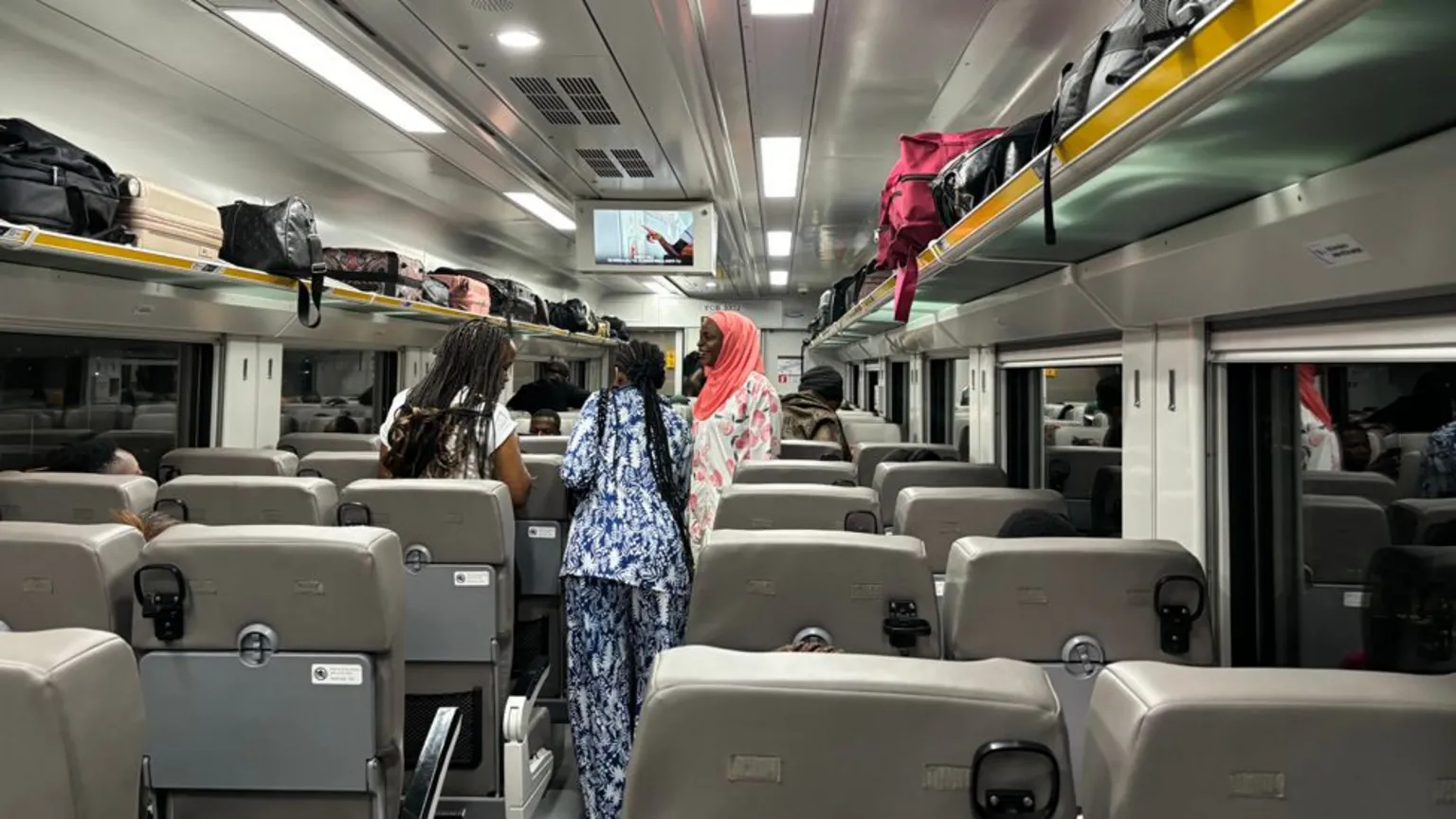
Basillioh Rukanga / BBC
Shaped and coloured like the country’s rare gemstone, tanzanite, the sparkling new railway terminal in Dar es Salaam is a symbol of Tanzania’s transport ambitions.
The glass panels gleam in the sun, like an outsize version of the prismatic bluish-purple gem that glitters in the light.
The trains – powered by electricity, a first for the region – carry passengers from the commercial hub to the capital, Dodoma, in less than four hours, half the time it takes by road.
It marks the starting point of one of the country’s strategic projects – the building of a 2,560km (1,590-mile) Standard Gauge Railway (SGR) envisaged to connect key cities and link up with neighbours Burundi, Rwanda and the Democratic Republic of Congo.
The 460km (285-mile) Dar es Salaam to Dodoma leg has been open since August, when President Samia Suluhu described the railway as “a pathway to our future” that would "enhance our standing in the region".
In Dodoma, the station is another grand building, resembling the rocky hills around the city – an effort to blend the country’s natural heritage with modernity.
It is a reluctant capital. In the middle of the country, it was first designated the centre of power 50 years ago, but it took the strong-willed late President John Magufuli to force government bodies to relocate.
But as most commercial activity, and even some government work, continues in Dar es Salaam, a fast and efficient transport link between the cities has been seen as vital.
The electric train has also made it smooth and convenient for the ordinary Tanzanian. A far cry from the experience on the road or the older slower, narrower train that this service replaces.
Inside the train carriage, the seats are clean, comfortable and reclinable. There is a foldable tray table attached to each one. A member of the train crew is on hand to sell hot and cold drinks as well as snacks.
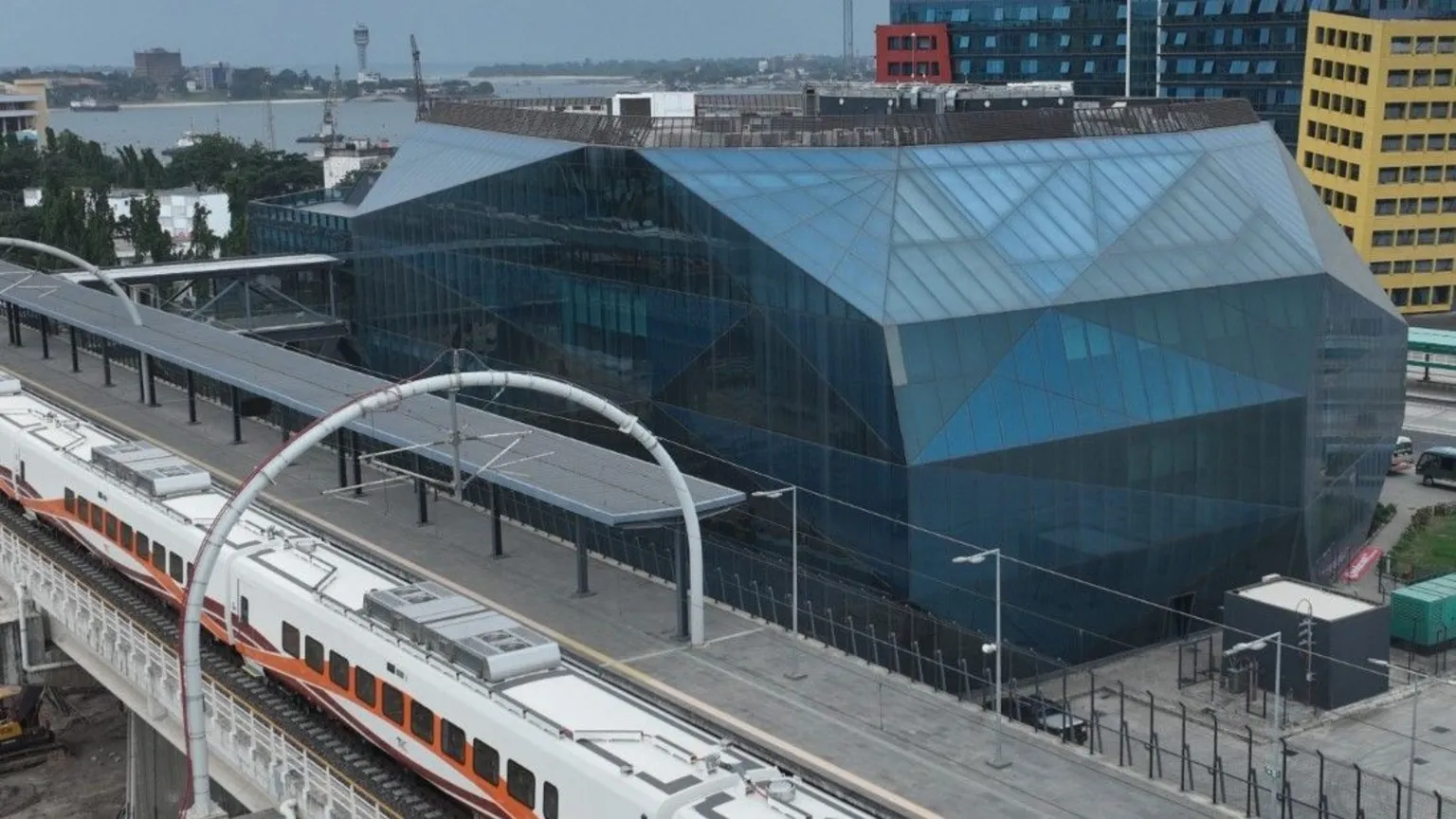
The terminal in Dar es Salaam is designed to resemble the gemstone tanzanite. Tanzania Railways Corporation
In economy class there are five seats in each row, three on one side of the aisle and two on the other. In the business and luxury (royal) classes there are two seats on either side of the row, offering more comfort and legroom.
"We are grateful, we are not tired," Gloria Sebastian who lives in Dar es Salaam, tells the BBC during a trip to visit her family in Dodoma. She is happy about the convenience that the train provides.
And she is not alone.
The man who is overseeing the building and operation of the SGR service says at least 7,000 passengers travel on the eight daily services on the line, which is already approaching capacity.
Machibya Masanja tells the BBC that the demand has been so high that "we cannot meet it with those trips we are making per day. We expect the number [of passengers] will double or triple." There are plans afoot to add more journeys.
The popularity means that advance planning is essential as services can be fully booked several days in advance.
Payment must be made within an hour of booking in order to reserve a seat. An economy class trip to Dodoma costs a reasonable 40,000 Tanzanian shillings ($15; £11), while going business class will set you back 70,000 shillings ($26).
The early morning service leaves Dar es Salaam at 06:00 but people are required to turn up two hours earlier for security checks.
The inside of the tanzanite-shaped building resembles an airport terminal. Passengers queue up and go through thorough checks just like in an airport. The luggage is scanned and people are sometimes frisked before accessing the boarding lounge.
One man later told the BBC that he felt the intense scrutiny seemed unnecessary, and there does not seem to have been any direct security threat, but the atmosphere is good-natured.
Nevertheless, there is an edginess from officials evidenced by the fact that a police officer questioned the BBC team who were taking pictures at the terminal – but they were quickly cleared after some checks.
The boarding was calm and orderly and the train pulled away on time.
Gathering speed – the trains currently hit a maximum of 120km/h (75mph) but can go faster – it was soon whizzing through the outskirts of Dar es Salaam as the early morning sun began to illuminate the panoramic view.
We cross a vast countryside - scrub and grassland plains interspersed with views of lush farms – and pass a meandering river, craggy terrain and undulating hills.
There were also the tunnels, causing some discomfort in the eardrum.
“You are advised to be chewing something, yawn or keep your mouth open,” the announcer said, to the amusement of some passengers.
For first-timers, the excitement was evident.
Bernice Augustine was with her daughter for a weekend vacation in Dodoma.
"It is awesome," she says. "You cannot compare it with the old train: it's convenient, it's clean, it’s easy."
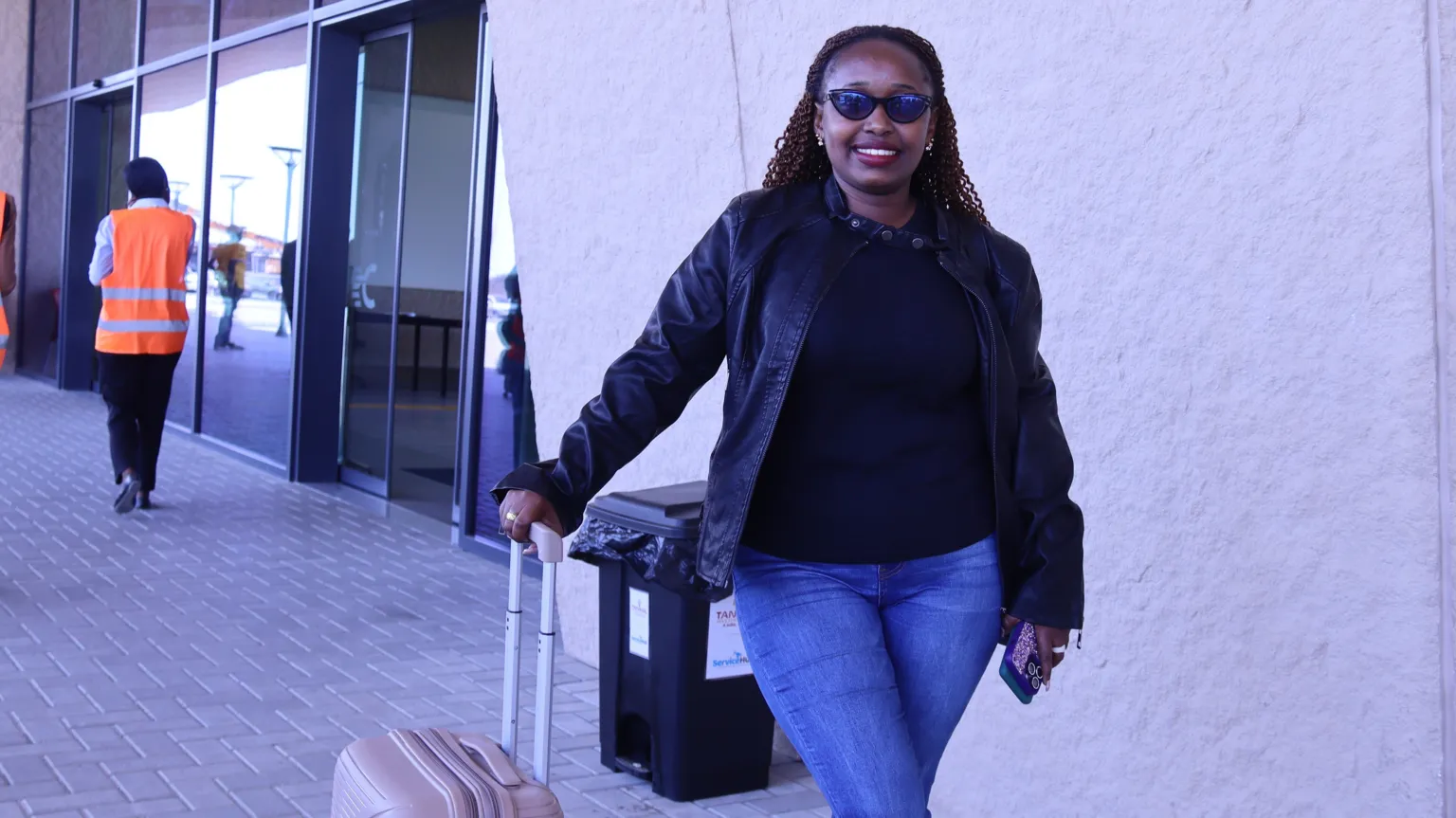
Bernice Augustine is a fan of the new train. Basillioh Rukanga / BBC
Hilaly Mussa Maginga has bad memories of going on the old line. After the trip to Kigoma he vowed never to get on a train again as he was so tired and his lower back was in pain.
But his curiosity was piqued when he heard about the SGR.
"When you are used to travel for long distances, you sit until it hurts, so when you have this option to travel for a shorter time, there is a lot to enjoy. We've come from far, thank God," he says.
For Mr Maginga the journey on the SGR is a zen-like voyage, a calm, unperturbed travel experience.
The project’s journey to reach this point has not been entirely smooth.
From the initial groundbreaking in 2017, the first section had been scheduled for completion in 2019. But it faced lengthy delays which the railway company attributes to Covid and construction costs as well as labour issues.
There have also been questions about its huge cost, estimated at $10bn (£8bn) upon completion.
Turkish firm Yapi Merkezi is the main contractor for the route’s first four sections, including the Dar es Salaam to Dodoma segment, while Chinese firms are building the other two.
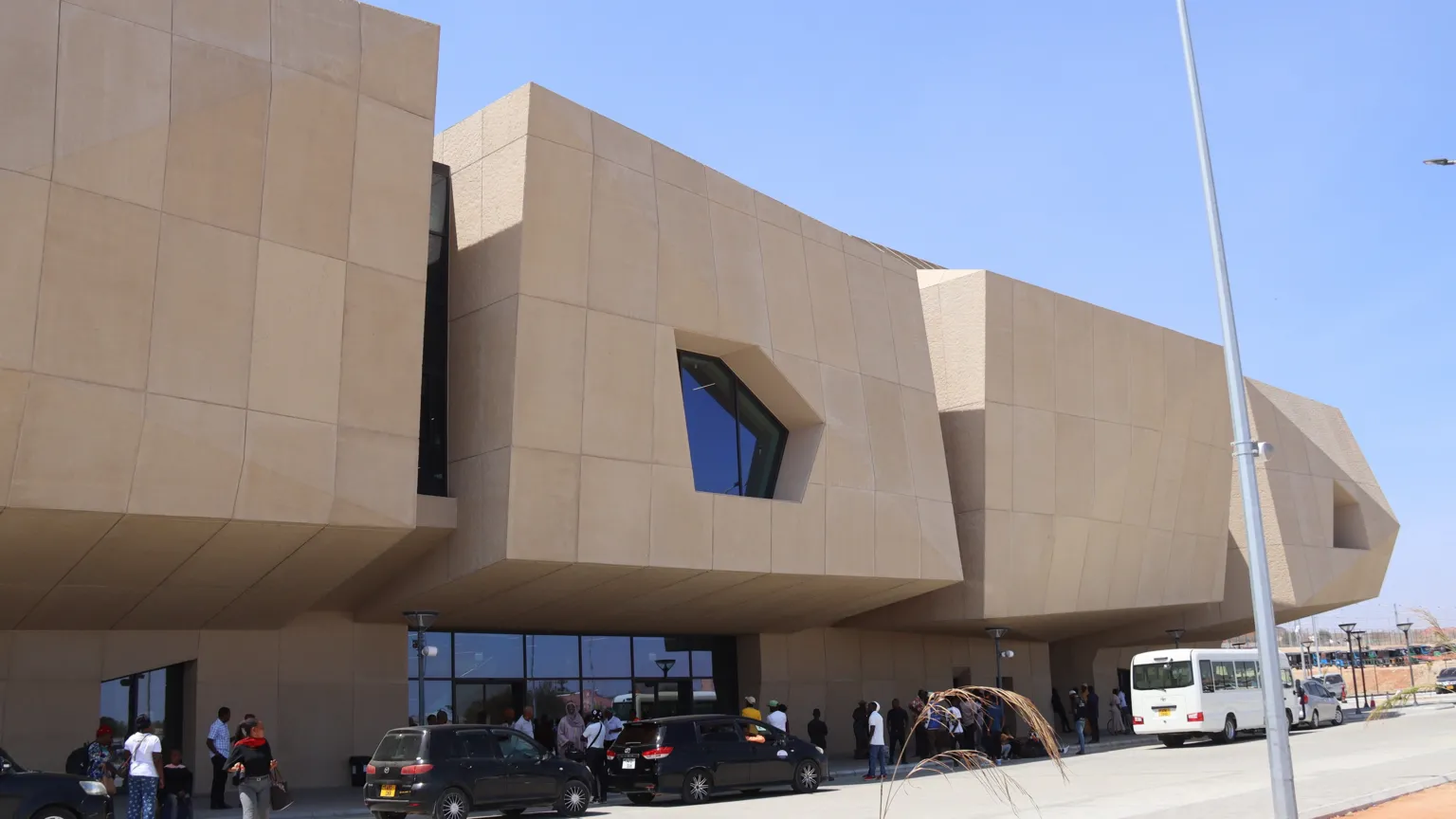
The station in the capital, Dodoma, represents the rocky outcrops common in the city. Basillioh Rukanga / BBC
Funding has come from the Tanzanian government and lenders, including from Denmark and Sweden, the Chinese Exim bank and the African Development Bank.
But Mr Masanja says it is too soon to be worried about profitability, saying this will only be realisable once the entire network is complete. He adds that the service is generating enough passenger income to offset operation costs, and that from January the company plans to introduce freight trains.
For now, he says, "its social contribution is much more profitable".
The service has occasionally been disrupted by power failure but Mr Masanja says they are building a dedicated power transmission line, tapping into the country’s vast power generation capacity to eliminate the risk of unstable power.
Using electricity has reduced the cost of operations to about a third of what would have been spent on diesel, which neighbouring Kenya uses to power its own SGR line, he tells the BBC.
"We are the cheapest in the region, and in Africa, in terms of the cost," he says.
Not everyone is entirely happy, though.
Adam Ally Mwanshinga, chairman of the Dodoma Bus Terminal Agents’ Union, says his members have lost a significant part of their business because of the railway.
The modern bus station in the capital was not so long ago a bustling terminal, he says, adding there are now 4-500 fewer passengers each day.
While it is cheaper to travel by bus, the convenience of the train has been more attractive for many.
"Business is down and life is difficult," Mr Mwanshinga says.
"The buses can’t fill up and the many businesses here that used to benefit from the many people coming here are suffering," he says.
However he seems resigned to the situation, saying that the SGR development "has done well for the majority of the people".
"It is the nature of life - there are those who benefit and those who will suffer."
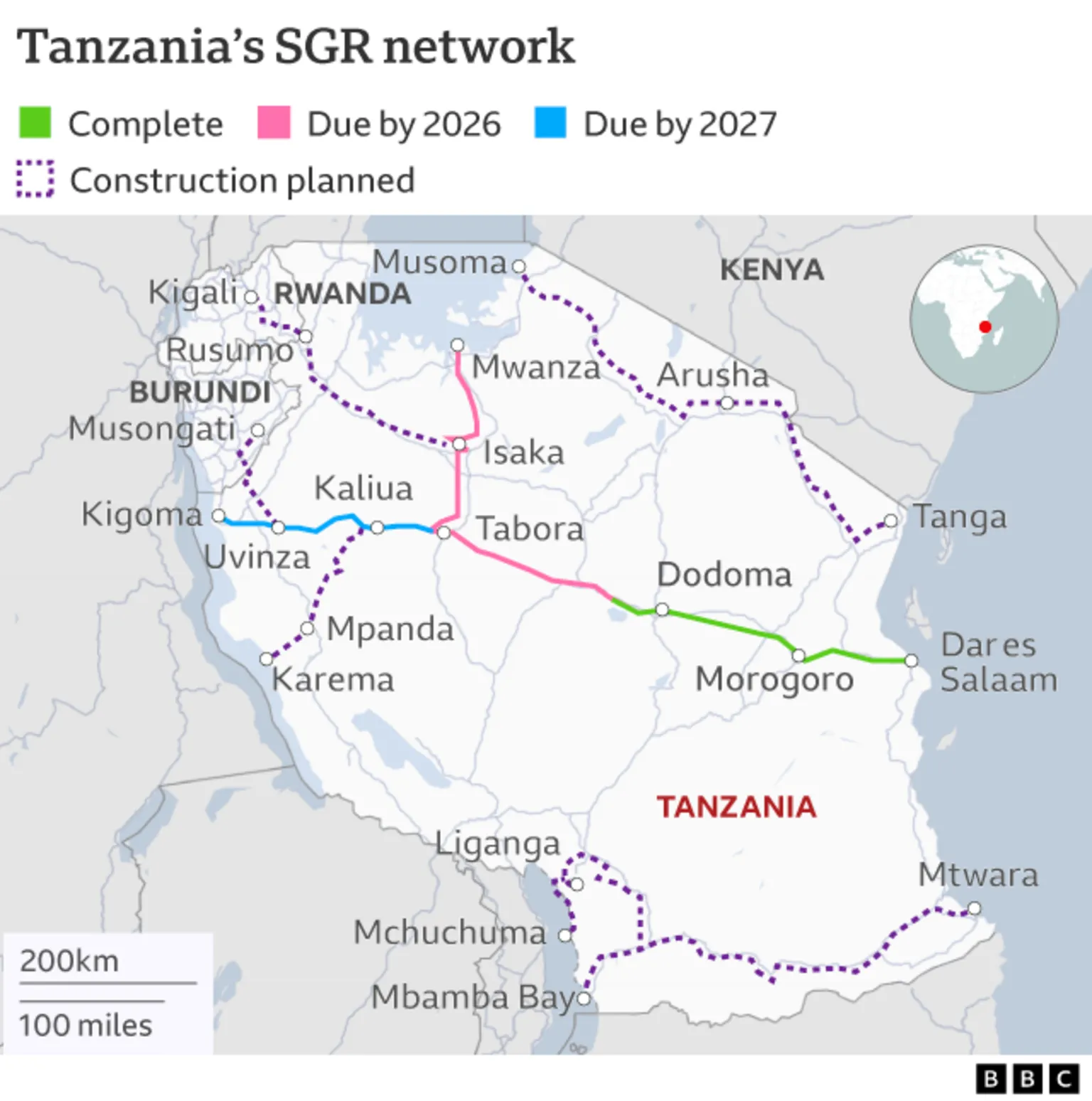
All aboard the sparkling railway breaking new ground for East Africa
Internet access in Angola reaches more than 11 million subscribers between 2021 and 2023
At the opening of ANGOTIC – 2024, the president of Angola, João Lourenço, revealed that the internet access rate in the country has risen to 33%.
Pedro Mbinza
June 13, 2024 12:23

Photo: CIPRA
The President of Angola, João Lourenço, said this Thursday, 13, in Luanda, that internet access in the country registered “significant” growth, between 2021 and 2023, reaching more than 11 million subscribers, with the penetration rate rising to 33%.
“The data listed above highlight a significant expansion in the accessibility and use of telecommunications services in our country. The growth in mobile subscriptions and internet penetration reflects the growing demand for connectivity and adoption of digital technologies by the population and companies”, said João Lourenço, during the opening of the 4th edition of the International Forum on Information and Communication Technologies (ANGOTIC-2024).
This increase, according to the Angolan head of state, can be attributed to several factors, including the expansion of the telecommunications network, the greater offer of accessible plans and the improvement in infrastructure.
“The increase in the penetration rate of mobile telephony and the internet is a positive indicator of digital inclusion and economic development, as it facilitates and speeds up access to information, education, financial services and business opportunities”, he stressed.
In alignment with the National Development Plan, João Lourenço guaranteed that his Government will continue investing in infrastructure and digital services, in order to achieve the objectives set, towards reducing info-exclusion, as well as the transformation and digitalization of the national economy, providing better quality of life for citizens.
Internet access in Angola reaches more than 11 million subscribers between 2021 and 2023
At the opening of ANGOTIC – 2024, the president of Angola, João Lourenço, revealed that the internet access rate in the country has risen to 33%.
Pedro Mbinza
June 13, 2024 12:23

Photo: CIPRA
The President of Angola, João Lourenço, said this Thursday, 13, in Luanda, that internet access in the country registered “significant” growth, between 2021 and 2023, reaching more than 11 million subscribers, with the penetration rate rising to 33%.
“The data listed above highlight a significant expansion in the accessibility and use of telecommunications services in our country. The growth in mobile subscriptions and internet penetration reflects the growing demand for connectivity and adoption of digital technologies by the population and companies”, said João Lourenço, during the opening of the 4th edition of the International Forum on Information and Communication Technologies (ANGOTIC-2024).
This increase, according to the Angolan head of state, can be attributed to several factors, including the expansion of the telecommunications network, the greater offer of accessible plans and the improvement in infrastructure.
“The increase in the penetration rate of mobile telephony and the internet is a positive indicator of digital inclusion and economic development, as it facilitates and speeds up access to information, education, financial services and business opportunities”, he stressed.
In alignment with the National Development Plan, João Lourenço guaranteed that his Government will continue investing in infrastructure and digital services, in order to achieve the objectives set, towards reducing info-exclusion, as well as the transformation and digitalization of the national economy, providing better quality of life for citizens.
Internet access in Angola reaches more than 11 million subscribers between 2021 and 2023
Born in France but searching for a future in Africa
3 days ago
Nour Abida, Nathalie Jimenez & Courtney Bembridge
BBC Africa Eye
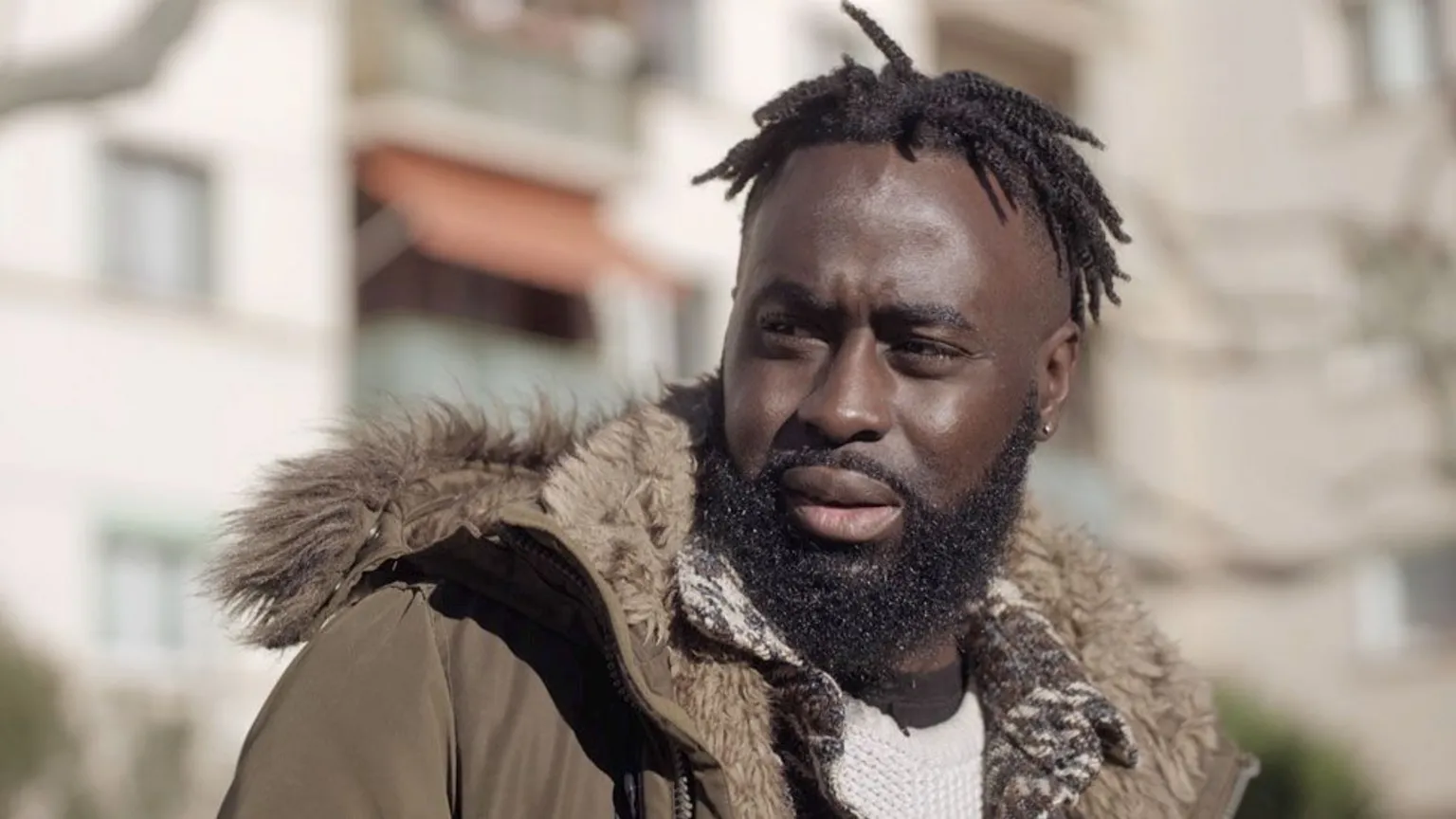
Menka Gomis is leaving his friends and family behind in France as feels he will have more opportunities in Senegal. BBC
Menka Gomis was born in France but has decided his future lies in Senegal, where his parents were born.
The 39-year-old is part of an increasing number of French Africans who are leaving France, blaming the rise in racism, discrimination and nationalism.
BBC Africa Eye has investigated this phenomenon - being referred to as a "silent exodus" - to find out why people like Mr Gomis are disillusioned with life in France.
The Parisian set up a small travel agency that offers packages, mainly to Africa, aimed at those wanting to reconnect with their ancestral roots, and now has an office in Senegal.
"I was born in France. I grew up in France, and we know certain realities. There's been a lot of racism. I was six and I was called the N-word at school. Every day," Mr Gomis, who went to school in the southern port city of Marseille, tells the BBC World Service.
"I may be French, but I also come from elsewhere."
Mr Gomis’s mother moved to France when she was just a baby and cannot understand his motivation for leaving family and friends to go to Senegal.
"I'm not just leaving for this African dream," he explains, adding it is a mixture of responsibility he feels towards his parents’ homeland and also opportunity.
"Africa is like the Americas at the time of… the gold rush. I think it's the continent of the future. It's where there's everything left to build, everything left to develop."
The links between France and Senegal - a mainly Muslim country and former French colony, which was once a key hub in the transatlantic slave trade - are long and complex.
A recent BBC Africa Eye investigation met migrants in Senegal willing to risk their lives in dangerous sea crossings to reach Europe.
Many of them end up in France where, according to the French Office for the Protection of Refugee and Stateless Persons (OFPRA), a record number sought asylum last year.
Around 142,500 people applied in total, and about a third of all requests for protection were accepted.
It is not clear how many are choosing to do the reverse journey to Africa as French law prohibits gathering data on race, religion and ethnicity.
But research suggests that highly qualified French citizens from Muslim backgrounds, often the children of immigrants, are quietly emigrating.
Those we met told us attitudes towards immigration were hardening in France, with right-wing parties wielding more influence.
Since their appointment last month, Prime Minister Michel Barnier and Interior Minister Bruno Retailleau have pledged to crack down on immigration, both legal and illegal, by pushing for changes to the law domestically and at the European level.
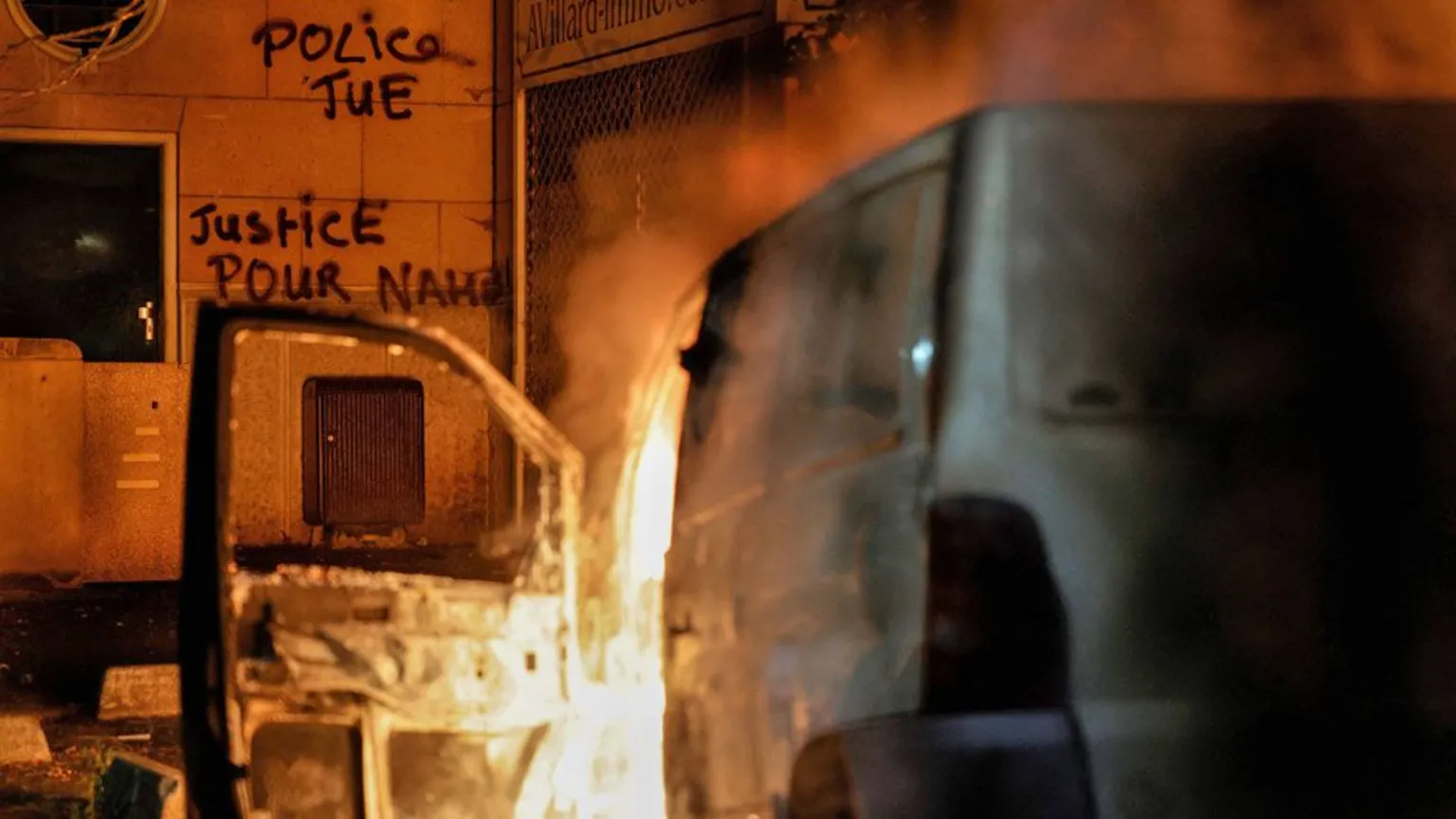
Riots broke out in France last year after a teenager of Algerian descent was shot by police at point-blank range. BBC
Fanta Guirassy has lived in France all her life and runs her own nursing practice in Villemomble - an outer-suburb of Paris - but she is also planning a move to Senegal, the birthplace of her mother.
"Unfortunately, for quite a few years now in France, we’ve been feeling less and less safe. It’s a shame to say it, but that’s the reality," the 34-year-old tells the BBC.
"Being a single mother and having a 15-year-old teenager means you always have this little knot in your stomach. You’re always afraid."
Her wake-up call came when her son was recently stopped and searched by the police as he was chatting to his friends on the street.
"As a mother it's quite traumatic. You see what happens on TV and you see it happen to others."
In June last year, riots erupted across France following the fatal shooting of 17-year-old Nahel Merzouk - a French national of Algerian descent who was shot by police.
The case is still being investigated, but the riots shook the nation and reflected an undercurrent of anger that had been building for years over the way ethnic minorities are treated in France.
A recent survey of black people in France suggested 91% of those questioned had been victims of racial discrimination.
In the wake of the riots, the UN High Commissioner for Human Rights (OHCHR) called on France to address "issues of racial discrimination within its law enforcement agencies".
The French foreign ministry dismissed the criticism, saying: "Any accusation of systemic racism or discrimination by the police in France is totally groundless. France and its police fight resolutely against racism and all forms of discrimination."
However, according to French interior ministry statistics, racist crimes rose by a third last year, with more than 15,000 recorded incidents based on race, religion or ethnicity.
For schoolteacher Audrey Monzemba, who is of Congolese descent, such societal changes have "become very anxiety-provoking".
Early one morning, we join her on her commute through a multicultural and working-class community on the outskirts of Paris.
With her young daughter, she makes her way by bus and train, but as she approaches the school where she works, she discreetly removes her headscarf under the hood of her coat.
"I want to go to work without having to remove my veil", says schoolteacher Audrey Monzemba. BBC
In secular France, wearing a hijab has become hugely controversial and 20 years ago they were banned in all state schools - it is part of the reason Ms Monzemba wants to leave France looking to move to Senegal where she has connections.
"I’m not saying that France isn’t for me. I’m just saying that what I want is to be able to thrive in an environment that respects my faith and my values. I want to go to work without having to remove my veil," the 35-year-old says.
A recent survey of more than 1,000 French Muslims who have left France to settle abroad suggests it is a growing trend.
It follows a peak in Islamophobia in the wake of the 2015 attacks when Islamist gunmen killed 130 people in various locations across Paris.
Moral panics around secularism and job discrimination "are at the heart of this silent flight", Olivier Esteves, one of the authors of the report France, You Love It But You Leave It, tells the BBC.
"Ultimately, this emigration from France constitutes a real brain-drain, as it is primarily highly educated French Muslims who decide to leave," he says.

Abdoul Sylla is concerned about his sister Fatoumata's decision to move to Senegal. BBC
Take Fatoumata Sylla, 34, whose parents are from Senegal, as an example.
"When my father left Africa to come here, he was looking for a better quality of life for his family in Africa. He would always tell us: 'Don’t forget where you come from.'"
The tourism software developer, who is moving to Senegal next moth, says by going to set up a business in West Africa, she is showing she has not forgotten her heritage - though her brother Abdoul, who like her was born in Paris, is not convinced.
"I’m worried about her. I hope she’ll do OK, but I don't feel the need to reconnect with anything," he tells the BBC.
"My culture and my family is here. Africa is the continent of our ancestors. But it’s not really ours because we weren’t there.
"I don't think you're going to find some ancestral culture, or an imaginary Wakanda," he says, referring to the technologically advanced society featured in the Black Panther movies and comic books.
In Dakar, we met Salamata Konte, who founded the travel agency with Mr Gomis, to find out what awaits French Africans like her who are choosing to settle in Senegal.
"When I arrived in Senegal three years ago I was shocked to hear them call me 'Frenchie'", says Salamanta Konte, travel agency co-founder based in Dakar. BBC
Ms Konte swapped a high-paying banking job in Paris for the Senegalese capital.
"When I arrived in Senegal three years ago I was shocked to hear them call me 'Frenchie'," the 35-year-old says.
"I said to myself: 'OK, yes, indeed, I was born in France, but I'm Senegalese like you.' So at first, we have this feeling where we say to ourselves: 'Damn, I was rejected in France, and now I'm coming here and I'm also rejected here.'"
But her advice is: "You have to come here with humility and that's what I did."
As for her experience as a businesswoman, she says it has been "really difficult".
"I often tell people that Senegalese men are misogynistic. They don't like to hear that, but I think it's true.
"They have a hard time accepting that a woman can be a CEO of a company, that a woman can sometimes give 'orders' to certain people, that I, as a woman, can tell a driver who was late: 'No, it's not normal that you're late.'
"I think we have to prove ourselves a little more."
Nonetheless, Mr Gomis is excited as he awaits his Senegalese citizenship.
The travel agency is going well and he says he is already working on his next venture - a dating app for Senegal.
Born in France but searching for a future in Africa
Dangote refinery starts Nigerian gasoline sales
By Adebiyi Olusolape and George Maher-Bonnett
16/09/24
Nigeria's 650,000 b/d Dangote refinery has started selling gasoline to the domestic market with state-owned oil firm NNPC as the sole offtaker.
NNPC said earlier today that it is paying Dangote in US dollars for September gasoline loadings. The firm's previously announced crude-for-gasoline swap programme with Dangote will be settled in the local currency and will start on 1 October, it added.
NNPC published a Dangote gasoline ex-refinery price of $736/t, or 898.78 naira/litre ($0.55/l), based on spot prices from 13 September. This equates to N842.61/l plus a Dangote premium of N56.17/l. Gasoline prices "are not set by government but negotiated directly between parties on an arm's length", in line with the provisions of Nigeria's Petroleum Industry Act, NNPC said.
Dangote provided videos of gasoline loading onto NNPC branded trucks at its gantry on the outskirts of Lagos on 15 September. NNPC issued a statement the previous day saying it had "deployed over 100 trucks, with hundreds more en route" for the start of gasoline sales. Dangote previously said the refinery has the capacity to load 2,900 trucks a day, in addition to three single point mooring (SPM) facilities, 25km offshore, that can load product onto 20,000-130,000t tankers.
NNPC has supplied gasoline to the domestic market almost exclusively since 2017, relying heavily on imports from overseas because of the parlous state of its own refineries. The start of gasoline loadings at Dangote will enable Nigeria to significantly reduce its dependence on gasoline imports.
NNPC's statement today about gasoline pricing comes against a backdrop of President Bola Tinubu adopting a gradual reduction of the country's longstanding gasoline subsidy instead of his stated policy goal of removing it in one fell swoop. His administration made that decision in response to a cost-of-living crisis and social unrest following last year's initial attempt to remove the subsidy.
Based on Dangote's ex-refinery price, regulatory fees of N9.96/l, distribution costs of N15/l and a margin of N26.48/l, NNPC said it has arrived at an estimated retail price of N950.22/l for gasoline in Lagos. That is 11pc higher than the level to which it hiked prices at its Lagos retail stations on 3 September. The company attributed that hike to the government reducing the extent to which it subsidises gasoline.
Still ramping up
Dangote said previously that it expects to be able to produce 57mn l/d (365,000 b/d) of gasoline at full capacity, more than enough to cover Nigerian demand, which it estimated at about 33mn l/d. But industry sources told Argus the refinery was only able to supply NNPC with 16mn l of gasoline over the weekend.The refinery is still some way off reaching capacity, with crude feedstock supply falling by 34pc on the month to 185,000 b/d in August, according to Argus tracking. Argus reported last week that Dangote is yet to complete the start-up of its residual fluid catalytic cracker (RFCC), which is holding the refinery back from hitting its gasoline production capacity. Test runs may have started on the unit, but it is unlikely to be fully operational until October or November.
NNPC said it supplied Dangote with 4.8mn bl of crude in August, down from 5.1mn bl in July. It said it will supply the refinery with 5.4mn bl this month and 11.7mn bl in October. The projected crude supply for October is a slight increase from the 11.3mn bl that NNPC announced on 5 September but a touch lower than the volume outlined by Nigeria's coordinating minister of the economy Wale Edun.
"From 1 October, NNPC will commence the supply of approximately 385,000 b/d of crude oil to the Dangote refinery, which will be paid for in naira," Edun said on 15 September.
In return, the Dangote refinery will supply gasoline and diesel "of equivalent value to the domestic market to be paid for in naira", Edun said. "Diesel will be sold in naira by the Dangote refinery to any interested offtaker," he said. But gasoline "will only be sold to NNPC. NNPC will then sell to various marketers for now".
Dangote refinery starts Nigerian gasoline sales
Railways ‘at centre’ of Algeria’s evolution, says UK ambassador
By Alicia Buller
October 2, 2024, 6:49 AM

Parts of Algeria cannot be developed without new railways, its ambassador to the UK says. Reuters/Louafi Larbi
Algeria is putting its railways at the centre of national infrastructure plans in part because roads are expensive and difficult to maintain, according to the country’s ambassador to the UK.
A significant expansion of the country’s railway network is scheduled to start this year, with the construction of 2,773km of railway lines – the equivalent of a route from Qatar to Istanbul – according to Anserif, the country’s state-owned railway investment agency.
Projects covering almost 5,000km are already under construction, including lines between Tlemcen in the west of Algeria and Sidi Bel Abbès, Guelma and Tiaret, Frenda and Tiaret, in the centre of the country, and Ain El Beida and Oum El Bouaghi in the east.
Anesrif is also seeking companies to build a 575km section of line to a remote iron ore mine at Gâra Djebilet. The Algiers metro is also being developed.
- Algeria’s UK ambassador: ‘We must modernise our economy’
- Algeria’s GDP growth to slow as oil production dips
- Algeria’s rail tender aims to boost iron ore mining sector
Parts of Algeria, the largest country by area in Africa, cannot be developed without new railways – particularly in the south – for agriculture and access to oil fields, Nourredine Yazid, the ambassador, said at a roundtable discussion in London last week organised by the Arab British Chamber of Commerce.
Yazid said: “We are using Chinese and American rail companies. They have experience of the desert environment. For terrain like Algeria, building roads and maintaining them is very costly, so we are focused on rail.”
The International Monetary Fund said Algeria’s economy grew by 4.2 percent to $245 billion in 2023, as a result of a rebound in hydrocarbons, which make up 93 percent of its exports, according to the World Bank.
The IMF expects growth to remain strong at 4 percent in 2024, supported in part by large fiscal spending.
In July the World Bank announced that Algeria was one of only four countries in the world that changed classifications from lower-middle income to upper-middle income.
Railways ‘at centre’ of Algeria’s evolution, says UK ambassador
